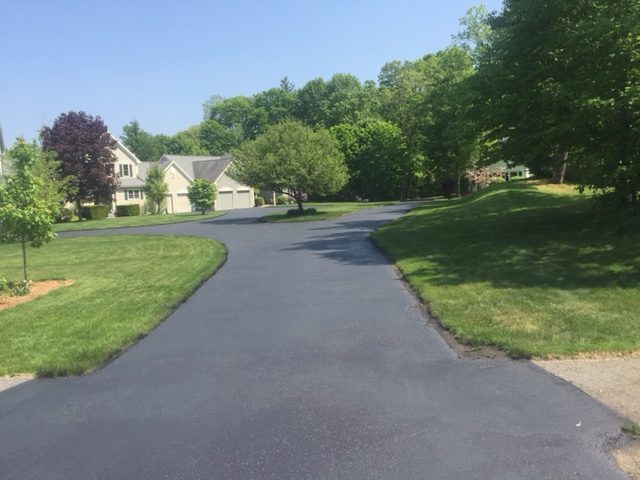Cold Mix Asphalt Vs. Hot Mix Asphalt: Which Is Right for You?

Composition Distinctions
Cold mix asphalt is generated by emulsifying the asphalt binder with water and an emulsifying agent before mixing it with aggregate. The hot mix asphalt production process entails warming the accumulation and asphalt binder independently prior to integrating them at the asphalt plant.
Furthermore, cold mix asphalt tends to be less thick and extra adaptable than warm mix asphalt. This adaptability makes it far better suited for areas with higher degrees of activity, such as driveways or roadways with heavy website traffic. In comparison, warm mix asphalt is understood for its high sturdiness and resistance to rutting and fracturing, making it a recommended option for highways and high-traffic roads where long life is critical.
Installment Refine Variances
The procedure of mounting chilly mix and hot mix asphalt exhibits remarkable variances in their needs and procedures. Cold mix asphalt, being a more flexible product, can be applied directly from the bag or container onto the pit or damaged location. It needs minimal preparation job, such as cleansing the location and compacting the cool combine with hand tools. This makes it a practical choice for momentary and fast repairs. On the other hand, warm mix asphalt necessitates an extra elaborate installation procedure. It involves warming the mix to heats prior to laying it down on an appropriately prepared base. The preparation consists of condensing the base, applying a tack coat, and making use of heavy machinery like pavers and compactors for a sturdy and smooth surface. As a result of the heating demands, hot mix asphalt installations are typically executed by specialists with specific tools, making certain a much more structurally sound and irreversible outcome.
Durability and Longevity Aspects
When taking into consideration asphalt alternatives, durability and long life are vital variables to review for long-term sidewalk efficiency,. Warm mix asphalt (HMA) is recognized for its phenomenal durability and durability. The high temperature levels throughout the mixing and laying process permit for better compaction, causing a denser and stronger pavement structure. This leads to HMA being more immune to rush hour loads, harsh climate condition, and the impacts old compared to cool mix asphalt (CMA)
In regards to longevity, HMA usually exceeds CMA because of its superior toughness and resistance properties. HMA pavements have a longer life span, calling for less constant repair services and upkeep, which can equate to cost savings in the future. Furthermore, HMA sidewalks are more quickly personalized to satisfy details job requirements, better enhancing their resilience.
Expense Factors To Consider
Considering the financial implications is an essential aspect when examining the selection in between hot mix asphalt (HMA) and cold mix asphalt (CMA) for pavement projects. While the initial price of warm mix asphalt is commonly greater than that of cool mix asphalt, HMA usually gives a much more cost-efficient remedy in the lengthy run due to its premium longevity and long life.
In enhancement to material prices, it's vital to consider the costs connected with installment and maintenance when contrasting HMA and CMA. Ultimately, the choice in between HMA and CMA ought to take into account not just the initial price however these details additionally the long-term monetary effects to establish the most affordable choice for the specific pavement job.
Environmental Impact Contrast
Contrast of the ecological impacts between hot mix asphalt (HMA) and cold mix asphalt (CMA) exposes distinctive differences in sustainability methods. HMA manufacturing requires high temperatures, bring about increased power consumption and greenhouse gas discharges. The process additionally launches volatile organic substances (VOCs) and harmful air toxins (HAPs) into the atmosphere. On the other hand, CMA find more is generated and used at reduced temperature levels, minimizing power use and emissions substantially. The reduced production temperature levels of CMA cause lowered gas intake and lower levels of CO2 discharges, making it a much more ecologically friendly option.
Moreover, the usage of CMA commonly entails recycling existing asphalt sidewalk, promoting source preservation and lowering the amount of waste sent out to garbage dumps. By opting for CMA over HMA, roadway building projects can add positively to ecological conservation initiatives.
Verdict
To conclude, the option between chilly mix asphalt (CMA) and warm mix asphalt (HMA) depends on different variables such as structure, installment process, toughness, longevity, expense, and ecological impact. asphalt patch repair. While CMA offers a quick and economical remedy for small repairs, HMA makes sure superior sturdiness and long life for hefty traffic areas. Think about these variables Website carefully to identify which type of asphalt is the ideal choice for your paving needs

Considering the economic implications is an essential element when reviewing the option in between warm mix asphalt (HMA) and cool mix asphalt (CMA) for pavement jobs. While the preliminary price of hot mix asphalt is normally higher than that of chilly mix asphalt, HMA usually provides a much more economical solution in the long run due to its premium resilience and durability. asphalt repair.Comparison of the ecological influences in between warm mix asphalt (HMA) and cold mix asphalt (CMA) reveals distinct differences in sustainability methods.In final thought, the option in between cold mix asphalt (CMA) and hot mix asphalt (HMA) depends on different variables such as make-up, installment procedure, durability, longevity, price, and ecological effect